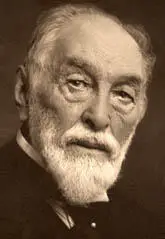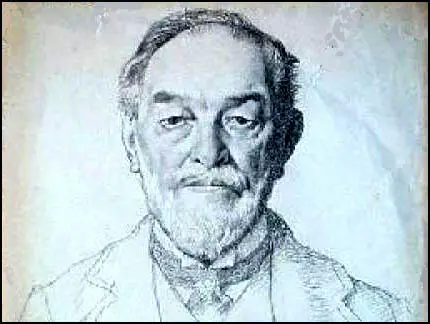Frederic Harrison

Frederic Harrison, the son of a prosperous stockbroker, was born in London on 18th October 1831. After being educated at King's College School and Wadham College, Oxford, where he obtained a first-class degree. In 1855 he read law at Lincoln's Inn and in 1858 was called to the Bar.
Harrison developed radical political views after reading the work of John Ruskin and Thomas Carlyle. He was also influenced by the the ideas of the Christian Socialists and in 1859 began lecturing at the Working Men's College. Harrison gave support to George Potter and his building workers during their industrial disputes in the early 1860s. He began a regular contributor to trade union and radical journals. In these articles he argued that trade unions represented working-class democracy in action.
When the head of the Conservative government, Earl of Derby decided to set up a Royal Commission on Trade Unions in 1867, George Potter, writing for the Bee-Hive, called for a working man to be included or a "gentleman well known to the working classes as possessing a practical knowledge of the working of Trade Unions, and in whom they might feel confidence." The government rejected the idea of a working man but they did ask Frederic Harrison to serve on the commission. Harrison was a very useful member of the commission, preparing union witnesses by telling them in advance what questions would be asked and rescued the from difficult situations during their cross-examination.
Robert Applegarth, the general secretary of the Amalgamated Society of Carpenters and Joiners was chosen as a union observer of the proceedings. Applegarth worked hard checking the various accusations of the employers and providing information to the two pro-union members of the Royal Commission, Harrison and Thomas Hughes. Applegarth also appeared as a witness and it was generally accepted that he was the most impressive of all the trade unionists who gave evidence before the commission.
Frederic Harrison, Thomas Hughes and the Earl of Lichfield refused to sign the Majority Report that was hostile to trade unions and instead produced a Minority Report where he argued that trade unions should be given privileged legal status. Harrison suggested several changes to the law: (1) Persons combining should not be liable for indictment for conspiracy unless their actions would be criminal if committed by a single person; (2) The common law doctrine of restraint of trade in its application to trade associations should be repealed; (3) That all legislation dealing with specifically with the activities of employers or workmen should be repealed; (4) That all trade unions should receive full and positive protection for their funds and other property.
The Trade Union Congress campaigned to have the Minority Report accepted by the new Liberal government headed by William Gladstone. This campaign was successful and the 1871 Trade Union Act was based largely on the Minority Report.
The trade union movement was very pleased with the work that Frederic Harrison had done on the Royal Commission and he was offered the editorship of the Bee-Hive. Harrison declined but over the years wrote thirty-two articles for the paper. He also continued to give legal advice to unions in dispute with the law. Harrison was also active in the Reform League where he argued for adult suffrage.
In 1889 Harrison was appointed alderman of the new London County Council. Harrison sat with the ruling Progressive Party that included John Burns, John Benn, Sidney Webb, Harry Gosling and Ben Tillett. Harrison also served as chairman of the LCC's Improvements Committee.

Harrison wrote a large number of books during his life including: William Cromwell (1888), Studies in Early Literature (1895), John Ruskin (1902), Autobiographic Memoirs (1911), The Positive Evolution of Religion (1913), The Meaning of War for Labour (1914) and Jurisprudence and the Conflict of Laws (1919).
Frederic Harrison died on 14th January 1923.

